Abishag's Voice: A Journey to Communication
Abishag Sidkalev, born with cerebral palsy, finds her voice through faith, love, and technology, dreaming of new shoes for the coming of the messiah.
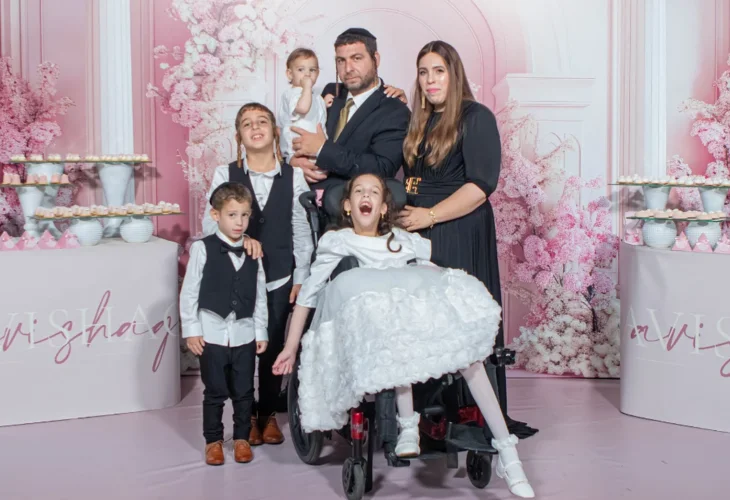
Zoharit Sidkalev and her husband were young and fresh parents, less than a year into their marriage, when they left the hospital with their firstborn daughter, Abishag.
The baby lay in a shiny new car seat, wrapped in soft clothing, but underneath the surface of happiness lingered a cloud of worry. Abishag had been born via emergency C-section after a prolonged and painful delivery. Eleven days in the NICU ended with great hope that she would recover and everything would be normal. The doctors discharged the parents without special instructions, yet as Zoharit recalls, they had felt from the start that something wasn't quite right.
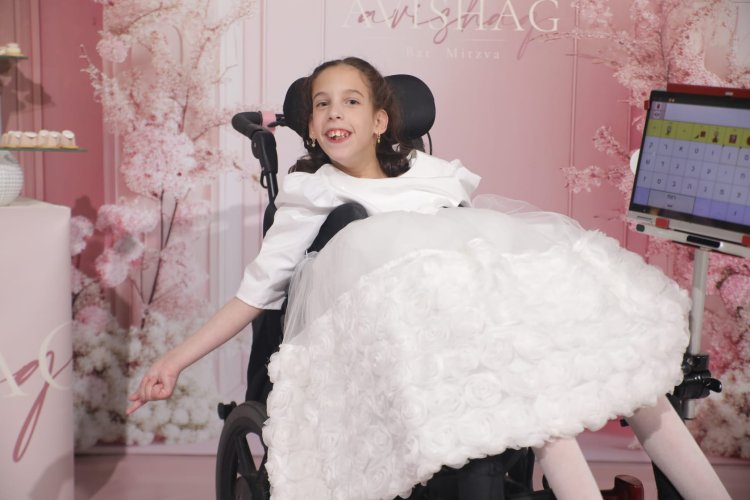
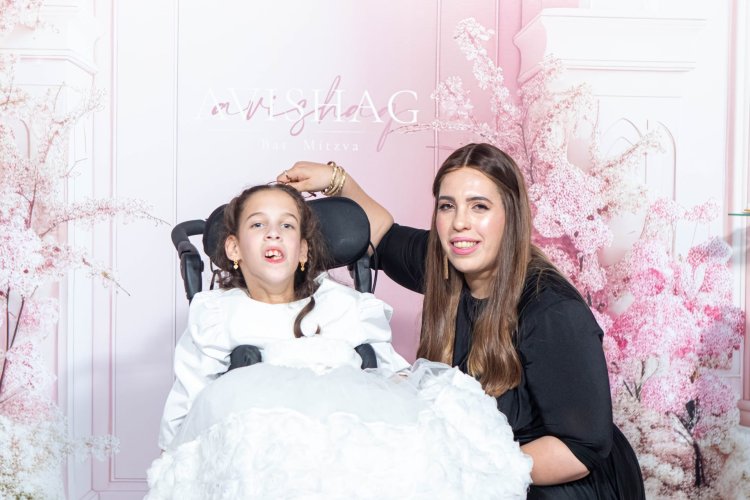
Clouds of Worry
"When we were discharged, they told us we would need to bring Abishag for developmental follow-ups every week," notes Zoharit. "These follow-ups only strengthened my feelings that something wasn't quite right. As Abishag grew, we realized she wasn't developing at all - not lifting her head, not holding it up, not turning over, not putting hands in her mouth... As months passed, it became more concerning. Eventually, we also noticed facial spasms, her body starting to gain tone, and it was clear she was deeply frustrated by her inability to do anything."
"However, as a mother with her first child and a sister to siblings who were all significantly older at the time, I didn't know what a baby should be doing at each stage, so I didn't grasp the gap. I only noticed the serious faces of the occupational therapist and physiotherapist who met with us weekly, and I worried."
"When Abishag was eight months old, at a physical function level like a newborn, I sat at the computer and started browsing Google, soon encountering the term 'cerebral palsy'. I self-diagnosed a condition that matched Abishag exactly. I read on about its varying degrees, from very mild to severe body involvement. I chose to believe my daughter's condition was mild. It was impossible to believe otherwise - she was so charming, smiling, and understood everything. How could she be paralyzed?"
"Finally, I printed the diagnosis and took it to the physiotherapist who had been seeing us. I asked if it was possible my daughter had cerebral palsy, and she was astounded by the question. She carefully avoided answering directly and said: 'I'll pass this to the neurologist, only he can diagnose', but I saw the expression on her face like: 'Yes, you're right'.
"We went to the chief neurologist at Soroka with Abishag, who told us straightforwardly: 'The child is significantly affected - from head to toe'. At that moment, I couldn't hear the rest of the conversation. I felt the sky was falling. My husband was also in shock. Nonetheless, we managed to ask the doctor about her future, and his response was: 'You're people of faith, and for people like you, I don't want to decide fate. Pray to Hashem because I've seen miracles here, and I hope you also experience miracles'.
"We left the room, initially silent. Even between ourselves, we couldn't talk. We just placed Abishag in her stroller, and she continued being our baby. But something in us dimmed. It was so hard to process, and we couldn't even tell others. We had long days filled with sheer chaos, where I didn't want to see anyone, just stay at home and that's it."
But the diagnosis also had another implication - starting treatment for Abishag. "We got a referral to a rehabilitation daycare," Zoharit recounts. "It was a shaking moment, an unequivocal realization that your child is not a regular baby, yet it truly saved us and helped us return to life. Until then, Abishag was with me at home, always in my arms, not allowing me to do anything else.
"The daycare had all the necessary tools for her care, including rehabilitation means to sit and stand her, and there were many discussions with us, the parents, explaining how to cope with the situation. I began to see my daughter blossom, be content, and cry less. I also became more relaxed.
"My parents also became more aware that Abishag had special needs and, despite the difficulty, they poured their soul into supporting her - attending all events at the daycare, supporting her constantly, buying many gifts and developmental toys, and hosting us nearly every Shabbat. They went above and beyond for Abishag and until today have a special love and invest greatly in her."
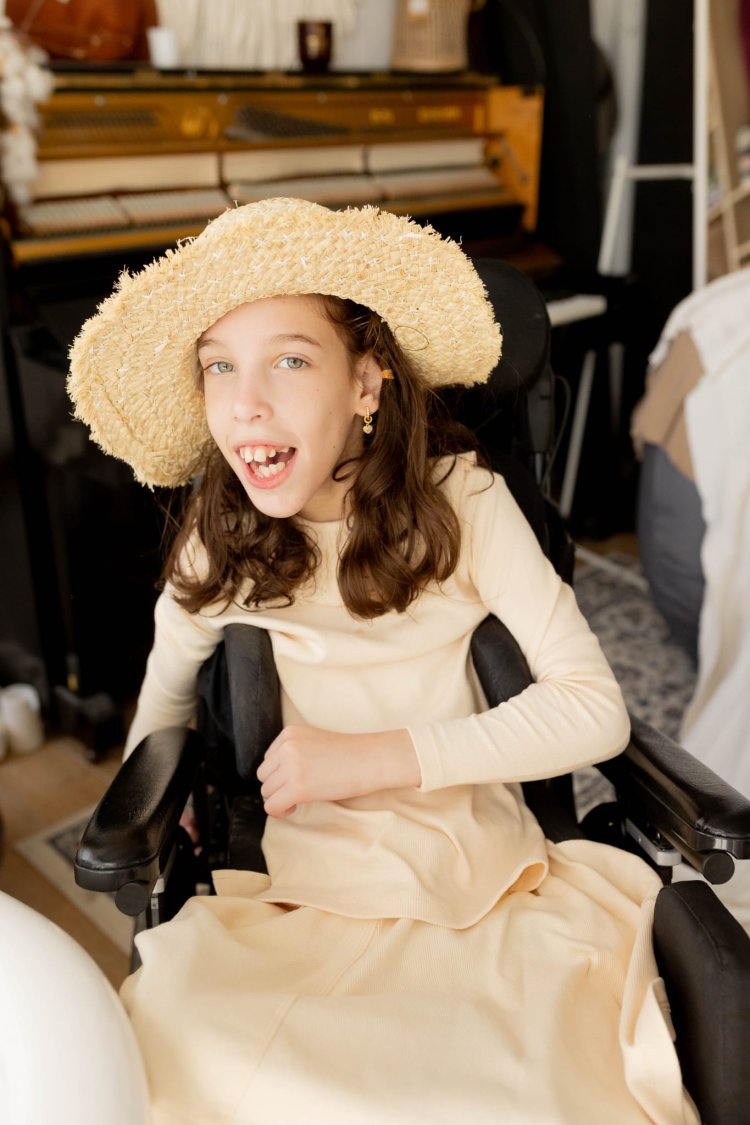
Connecting with the World
Abishag took her most significant developmental step at age three. "Her preschool identified she was smart and communicatively capable, so they decided to use an eye-tracking communication system, and were simply amazed by her abilities," Zoharit shares. "She grasped how to operate the system in seconds and quickly used it to respond with 'yes' and 'no'. Even company representatives who supplied the system were surprised, claiming they'd never seen a child of such age understand operation so swiftly.
"On that same day, she learned to press additional buttons and pointed out the word 'hurt'. When we asked Abishag: 'What hurts?', she directed the system to indicate 'ear'. It was the first time she could complain about a specific pain, as we could never know why she cried before. I decided to take her to a doctor, only to find out she had an ear infection, and it was hurting her. It was chilling to think that for three years, she had no way to say the simplest sentence: 'My ear hurts'.
Furthermore, Abishag went on to study at the Shepher School in Beit Shemesh, which her mother says worked wonders for her. There, she received personalized lessons with a special focus on communication, learning to express her desires through eye contact, write emails, and articulate everything she wants. "Today, this is her way of communicating with the world. This system acts as her voice," explains Zoharit. "I discuss everything with Abishag using the system, and she expresses herself well, including her dreams and intangible matters. She communicates it all."
And what does she do on Shabbats, when the system can't be used?
"It's indeed challenging. Fortunately, even though Abishag isn't verbal, she can make sounds, and at school, they taught her to modulate those sounds to resemble words. For instance, instead of 'Mom', she calls me 'I-ah'. The first time I heard her say it, I melted with excitement, and honestly, it still excites me every time."
How do Abishag's siblings treat her?
"They treat her as ordinarily as possible, like a regular sibling they sometimes play with or argue with. They see how we take her everywhere, never feeling the need to hide or feel embarrassed by her, heaven forbid. It's especially moving to see the bond between her and our little one, Libi. They both aren't verbal, but they love each other so much, and it's heartwarming to see them together each time."
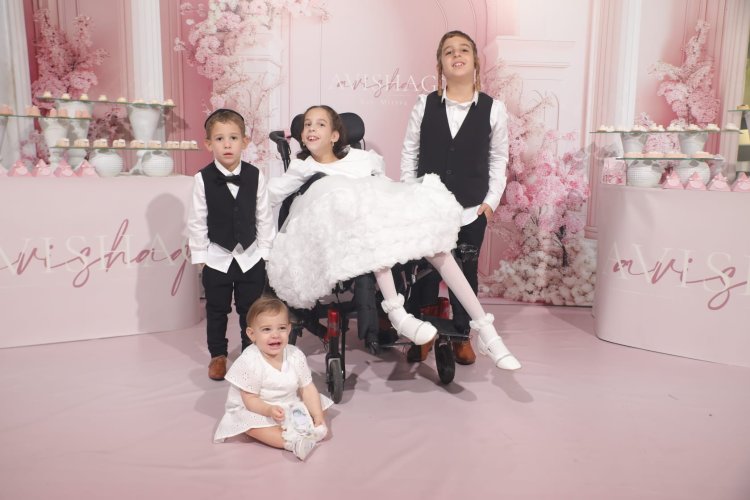
Shoes for the Messiah
Amongst daily life's rhythm, there are also particularly moving events, like Abishag's bat mitzvah celebrated a few months ago. "The entire event was planned according to Abishag's wishes," Zoharit emphasizes. "It began about a year ago when Abishag turned 11, and I asked her: 'You know next year you'll have a bat mitzvah?' Abishag replied: 'Of course, I want a big bat mitzvah and a white bridal dress'. I tried convincing her we'd wear something pink, that it would be more suitable, but there was no getting through to her. She insisted: 'I want a bridal dress'.
"A few months later, war broke out, and living in the southern region, we began to feel the stress and instability. Suddenly, the event seemed uncertain, and Abishag was so worried. After Passover, as events became viable again, we decided to organize the bat mitzvah, and within a month, we arranged an unforgettable event at the city's most elegant hall. It felt like it was truly the result of our and Abishag's prayers, along with two contributors who entirely funded it. We invited 150 guests, but 300 attended, making it all so special. Abishag was involved in choosing every single detail of the event. When I asked her: 'What mementos would you like to give out?', she replied: 'A prayer for challah, and write it's in honor of Abishag, daughter of Zoharit'. I did just that, showing she understands her situation better than any of us."
You seem like an inspiring and unique family. What gives you strength?
"It might sound clichéd, but Abishag herself gives us tremendous strength. Despite everything she goes through, she remains a happy child who believes in herself, knows exactly what she's capable of, what she wants, and ensures it happens. So yes, there are tough days, but when she wakes up smiling, it influences all of us, and nothing makes me happier than sending her to school happy and calm.
"Additionally, there are Abishag's three younger siblings who provide us so many moments of joy and happiness. I remember how with the son who came after her we were thrilled with each of his milestones - lifting his head, turning over, crawling - we came to appreciate it all, knowing it’s not taken for granted. When he started walking around his first birthday, we threw a real party. We were so moved by it."
Alongside caring for Abishag and raising their other children, Zoharit also runs a fruit platter business named after Abishag - 'Shugi-Fruit'. "Sometimes I don't know if I'm a business owner, a caregiver, Abishag's secretary, or maybe just a mom," she says with a smile, "but honestly, more than anything, I am a student. Abishag always tells me: 'Mom, when the messiah comes, right, I'll walk and not need the wheelchair anymore?' and I just learn from her what pure faith means. One day we bought her a pair of beautiful shoes, without any braces, at her request, and they sit on her shelf waiting for the messiah's arrival, something we're all so eagerly anticipating."
Photos taken by: Yair Pintz, Maayan Studio - Eitan Moshav, and Sarit Amar - Bar and Events

